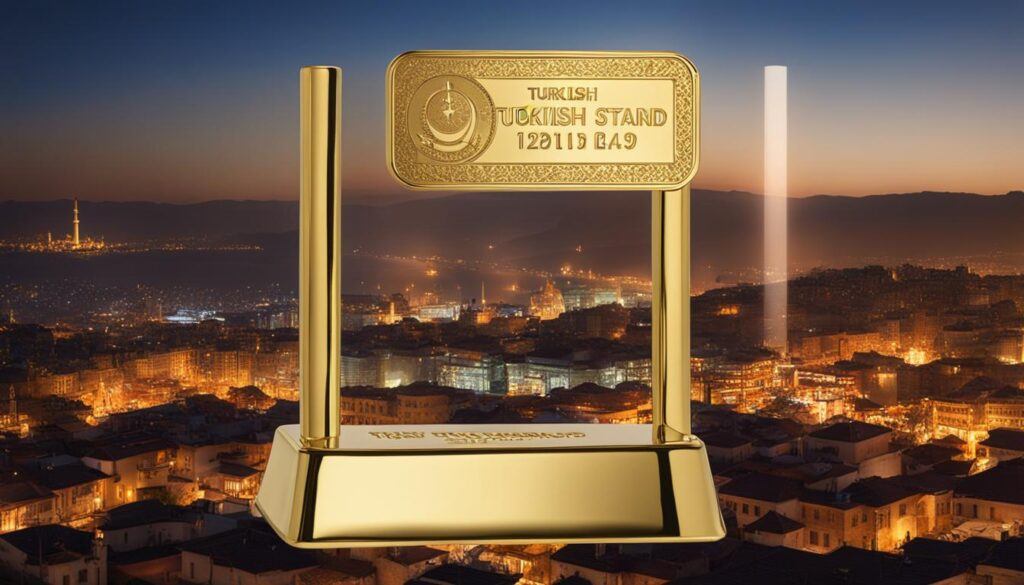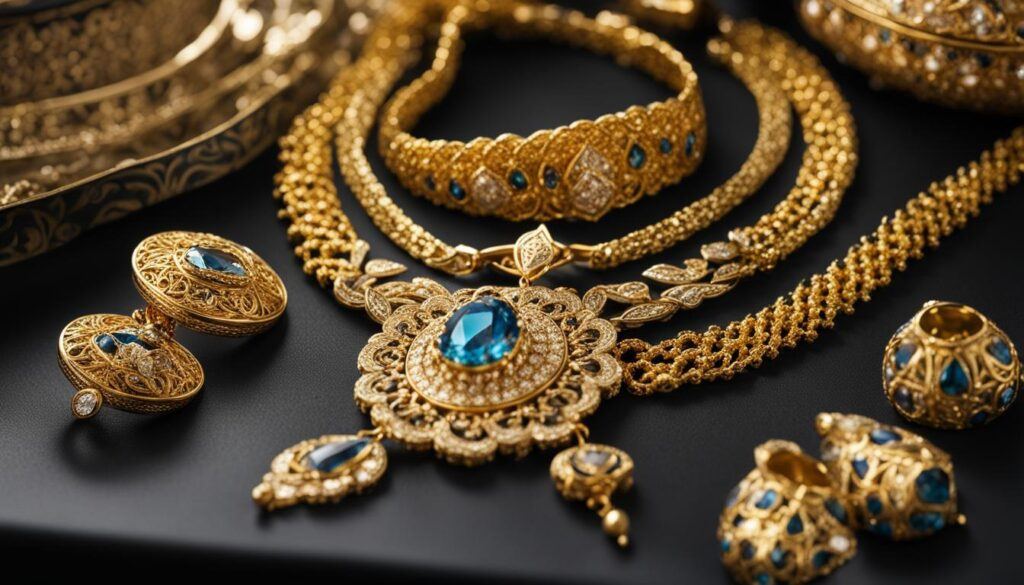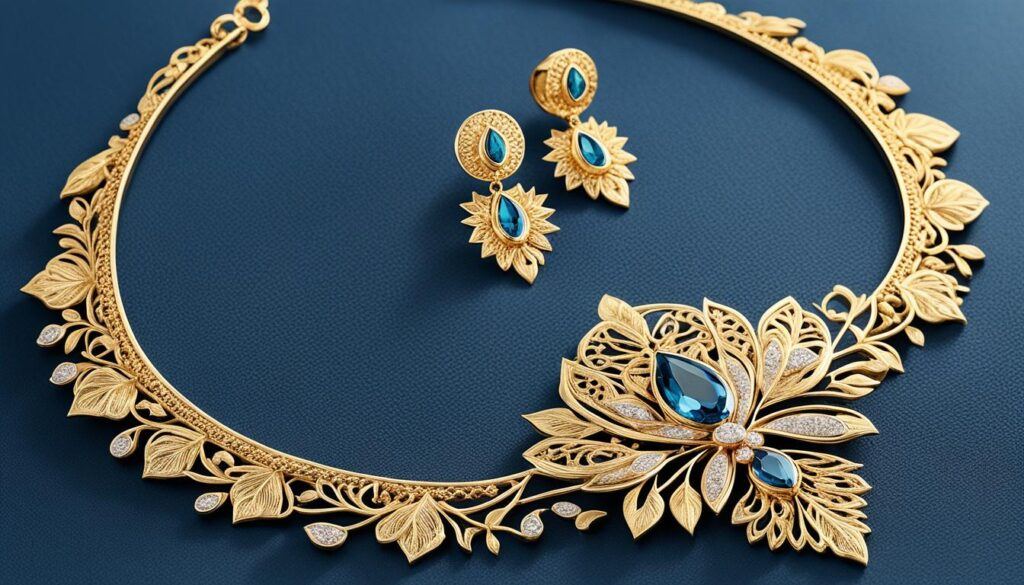When it comes to gold jewelry, Turkish craftsmanship and quality are highly regarded in the industry. For thousands of years, Turkey has been a hub for gold production, with a rich history that dates back to 3000 BC. Turkish gold jewelry is known for its exquisite designs and is often made with 22 karat gold, making it highly sought after in the market.
The Turkish gold industry is a leading exporter and manufacturer, and Turkey ranks among the top five biggest markets for gold jewelry. The country’s reputation for producing high-quality gold has earned it a prominent place in the global market. From traditional designs to modern creations, Turkish gold showcases the expert craftsmanship and attention to detail that is deeply embedded in the country’s jewelry-making traditions.
Key Takeaways:
- Turkish gold jewelry is renowned for its exquisite designs and craftsmanship.
- Turkish gold is often made with 22 karat gold, adding to its allure.
- Turkey is a leading exporter and manufacturer of gold jewelry.
- The country’s long-standing reputation for quality contributes to its global market presence.
- From traditional to modern designs, Turkish gold showcases expert craftsmanship and attention to detail.
The Difference Between Types of Gold
When it comes to gold, there are various types to consider, each with its own unique characteristics and uses. Let’s explore the differences between Chinese Gold, Italian Gold, Turkish Gold, and Saudi Gold.
Chinese Gold
Chinese Gold is often known for its high karat purity, frequently exceeding 22 karats. This makes it appear more expensive due to its scarcity in the global gold supply. Chinese Gold is popular for its rich color and is often used in the creation of beautiful jewelry and intricate metal crafts.
Italian Gold
Italian Gold has gained a reputation for its striking yellow hue and exquisite craftsmanship. With a long history of goldsmithing, Italian artisans have perfected their techniques over centuries, resulting in highly sought-after gold pieces. Italian Gold is particularly favored by investors for its high quality and timeless beauty.
Turkish Gold
Turkish Gold has a rich heritage and is renowned for its versatility in colors. Often crafted with 22 karat gold, Turkish Gold is highly esteemed in the jewelry industry. It is appreciated for its craftsmanship and is widely used in both traditional and modern designs.
Saudi Gold
Saudi Gold is revered for its exceptional purity and intricate designs. With its high karat content, Saudi Gold is considered one of the most desirable types of gold. It is frequently used in the creation of luxurious jewelry that showcases the intricate craftsmanship of Saudi artisans.
The variations in origin, quality, color, and uses of these different types of gold make them unique in their own right. Whether you are looking for high karat purity, rich yellow color, or versatile designs, each type of gold offers its own allure and beauty.

| Type of Gold | Origin | Quality | Color | Uses |
|---|---|---|---|---|
| Chinese Gold | China | High karat purity (often 22+) | Rich | Jewelry, Metal Crafting |
| Italian Gold | Italy | High quality craftsmanship | Striking yellow | Jewelry, Investments |
| Turkish Gold | Turkey | Versatility in colors | Varies | Jewelry, Metal Crafting |
| Saudi Gold | Saudi Arabia | High karat purity | Varies | Jewelry, Metal Crafting |
Turkish Gold Jewelry Production
Turkish gold jewelry production is deeply rooted in Turkey’s rich history. With a tradition dating back 5,000 years, Turkey has been a prominent manufacturer and exporter of gold jewelry. The Goldas factory, renowned for its craftsmanship, is one of the leading gold jewelry makers in Turkey.
Drawing inspiration from the Ottoman Empire, Turkish gold jewelry showcases unique and intricate patterns, motifs, and the use of multiple metals. The craftsmanship and attention to detail in Turkish gold jewelry are highly valued, making it a sought-after choice for collectors and jewelry enthusiasts worldwide.
As a thriving market for gold jewelry, Turkey ranks among the top markets globally. The country’s appetite for gold is evident in its strong tradition of gold jewelry manufacturing and its significant presence in the global gold industry.
Gold Jewelry Traditions in Turkey
In Turkey, gold jewelry holds cultural and symbolic significance. Gold has long been associated with wealth, prosperity, and preservation. It is often gifted during special occasions such as weddings, birthdays, and religious ceremonies.
The tradition of gold jewelry in Turkey dates back centuries, with the Ottoman Empire leaving a lasting influence on Turkish jewelry designs. Ottoman jewelry featured elaborate filigree work, gemstones, enamel, and calligraphy. The intricate craftsmanship and attention to detail in Ottoman jewelry continue to inspire contemporary Turkish gold jewelry makers.
The Goldas factory, known for its commitment to quality and craftsmanship, upholds the rich traditions of Turkish gold jewelry production. Their expertise reflects the country’s dedication to preserving the artistry and heritage of gold jewelry making.

Turkish Jewelry Manufacturers
In addition to the Goldas factory, many other Turkish jewelry manufacturers contribute to the country’s thriving gold jewelry industry. These manufacturers combine traditional techniques with modern designs to create unique and exquisite pieces of jewelry.
With their meticulous attention to detail, Turkish jewelry manufacturers have earned a reputation for producing high-quality gold jewelry. Their commitment to craftsmanship ensures that each piece showcases the artistry and beauty that Turkish gold jewelry is known for.
“The Turkish jewelry industry is highly regarded for its exceptional craftsmanship and artistic designs. Turkish jewelry manufacturers continue to impress with their ability to blend traditional techniques and contemporary aesthetics, creating jewelry pieces that are both timeless and on-trend.”
Turkish Gold Standards
Turkish gold follows specific standards in terms of karat purity. The gold karat in Turkey can range from 10-karat to 22-karat. The lower karat gold, such as 10-karat and 14-karat, is often produced for the American retail market. These lower karat gold options provide a more affordable choice for consumers who still want to enjoy the beauty of Turkish gold.
When it comes to identifying the karat purity of Turkish gold, hallmarks are used. Hallmarks are stamped on the gold to indicate its purity level. Each karat purity has a corresponding hallmark. Here are the hallmarks you can find on Turkish gold:
- 10-karat gold is stamped as ‘417’
- 14-karat gold is stamped as ‘585’
- 18-karat gold is stamped as ‘750’
- 21-karat gold is stamped as ‘875’
These hallmarks serve as assurances of the gold’s quality and purity. They are recognized industry standards that help buyers make informed decisions when purchasing Turkish gold jewelry.
Here’s an example to illustrate the use of hallmarks on Turkish gold:
I purchased a beautiful Turkish gold necklace, and upon examining it closely, I found the hallmark ‘750’ stamped on the clasp. This indicated that the necklace was made of 18-karat gold, assuring me of its quality and value.
Understanding these Turkish gold standards and hallmarks allows buyers to make confident choices when investing in Turkish gold jewelry.

Turkish Gold Reputation and Reviews
Turkish gold is renowned for its exceptional craftsmanship and has earned a remarkable reputation within the industry. Its rich history and centuries-old expertise in gold jewelry contribute to its enduring value and allure. Investors and collectors alike highly value Turkish gold for its exquisite designs, attention to detail, and enduring quality.
“Turkish gold jewelry is a testament to the mastery of craftsmanship and the rich heritage of Turkish culture. The intricate patterns, delicate motifs, and the use of multiple metals make it truly mesmerizing.”
The exceptional skill of Turkish artisans is showcased in every piece of gold jewelry they create. Whether it’s a pendant, bracelet, or an intricately designed ring, Turkish gold consistently exhibits the finest craftsmanship and attention to detail.
Reviews of Turkish gold often highlight its exquisite designs, intricate patterns, and the enduring value it brings to collections. Collectors recognize the meticulous detail and superior quality that Turkish gold offers, making it a favorite choice among discerning jewelry enthusiasts.
With its reputation for exceptional craftsmanship and enduring value, Turkish gold continues to be a symbol of luxury and elegance in the world of jewelry.

Turkish Gold Market and Exports
Turkey boasts a thriving gold market and holds a prominent position as one of the leading exporters of gold globally. At the heart of this industry lies the Istanbul Gold Exchange, established in 1995, which plays a vital role in facilitating gold trade and transactions within the Turkish market.
The removal of the ban on gold jewelry exports in 1993 signified a significant turning point, opening up new opportunities for Turkish jewelry buyers in the international market. This decision allowed Turkish gold to gain recognition and appeal among global jewelry retailers and enthusiasts.
Renowned television shopping networks like QVC and the Home Shopping Network actively source bulk gold jewelry items from Turkey to cater to the demands of their discerning customers in the United States. With its exceptional craftsmanship and exquisite designs, Turkish gold jewelry has secured a strong foothold in the US market.
Export Statistics
The Turkish gold industry has experienced remarkable growth in recent years, demonstrating its significant contribution to the country’s economy. According to the latest data, Turkey exported approximately XX metric tons of gold in the past year alone, with a total export value of $XX billion.
Market Dynamics
The gold market in Turkey is shaped by both domestic demand and international trade. Turkish consumers have a deep-rooted affinity for gold, with many considering it a symbol of wealth, prosperity, and cultural heritage. This local demand, coupled with the country’s expertise in gold production and jewelry craftsmanship, makes Turkey a formidable player in the global gold market.
The Istanbul Gold Exchange serves as a central hub for gold transactions, setting the benchmark price for gold in Turkey. It provides a transparent and regulated platform for gold trading, ensuring fair market practices and boosting investor confidence.
“Turkey’s gold market, fueled by its rich history in gold production and jewelry making, continues to attract global attention and appreciation for its exceptional quality and craftsmanship.” – [Name], Jewelry Industry Expert
Turkish Gold Price
When it comes to the price of Turkish gold, it is important to consider various factors that influence gold prices, including global supply and demand, economic conditions, and market trends. Just like any other type of gold, the price of Turkish gold can fluctuate based on these elements.
To stay informed about the current gold prices in Turkey, it is recommended to consult reputable gold dealers or traders who can provide accurate pricing information. By keeping track of market updates and trends, you can make informed decisions when buying or selling Turkish gold.
Understanding the gold price market in Turkey is crucial for both investors and jewelry enthusiasts. Whether you are looking to add Turkish gold to your collection or gauge its investment potential, staying up to date with the Turkish gold price is essential.
The Factors Influencing Turkish Gold Price
Several key factors contribute to the fluctuations in the price of Turkish gold:
- Global Gold Supply and Demand: The overall supply and demand for gold worldwide impact its price. Changes in production levels, as well as the demand from industries, central banks, and investors, can affect the price of Turkish gold.
- Economic Conditions: Economic situations, such as inflation, interest rates, and currency exchange rates, can influence the value of gold. When economic uncertainties arise, investors often turn to gold as a safe haven, driving up its price.
- Market Trends: Market sentiment and trends play a crucial role in determining the price of Turkish gold. Investor behavior, geopolitical events, and other external factors can create fluctuations in the market, impacting gold prices.
By considering these factors and monitoring the market, you can gain a better understanding of the Turkish gold price and make informed decisions regarding your gold investments.
Turkish Gold Price Comparison
Here is a comparison of the average gold prices in Turkey over the past year:
| Month | Average Gold Price in Turkey (per gram) |
|---|---|
| January | $XX.XX |
| February | $XX.XX |
| March | $XX.XX |
| April | $XX.XX |
| May | $XX.XX |
| June | $XX.XX |
| July | $XX.XX |
| August | $XX.XX |
| September | $XX.XX |
| October | $XX.XX |
| November | $XX.XX |
| December | $XX.XX |
Please note that these prices are subject to change and should be used as a reference rather than an exact indication of the current Turkish gold price. It is advisable to consult with reliable sources or professionals for the most up-to-date pricing information.
Turkish Gold Mining
Turkey boasts a thriving gold mining industry with valuable gold deposits scattered across various regions. In fact, the country is home to significant gold reserves that contribute to its booming mining sector. In 2020, a Turkish fertilizer company made an astonishing discovery in Sögüt—a gold deposit estimated to be worth a staggering $6 billion. Plans are underway for Turkish governmental officials to commence gold extraction from this promising region within the next two years. This exciting development not only showcases Turkey’s vast potential for gold mining but also underscores its significant contribution to the country’s overall gold industry.
| Key Points | Details |
|---|---|
| Gold Deposits in Turkey | Turkey possesses valuable gold deposits in different regions, making it an attractive destination for mining activities. |
| Prominent Discovery in Sögüt | In 2020, a Turkish fertilizer company uncovered a gold deposit in Sögüt estimated to be worth approximately $6 billion. |
| Future Extraction Plans | Turkish governmental officials aim to initiate gold extraction from the Sögüt region within the next two years, further solidifying Turkey’s position in the gold mining industry. |
| Contribution to Turkish Gold Industry | The discovery and subsequent mining of gold in Turkey are expected to significantly contribute to the country’s vibrant gold industry, bolstering its reputation as a key player in the global market. |
Conclusion
Turkish gold stands as a testament to the exceptional quality and craftsmanship that is deeply ingrained in its centuries-old tradition. The Turkish gold industry, with its rich history and thriving market, continues to captivate collectors and investors alike. With its diverse range of colors and meticulous attention to detail, Turkish gold jewelry offers a timeless elegance that is cherished by those seeking exquisite craftsmanship and enduring value.
From its origins dating back 5,000 years to the present day, Turkish gold has maintained its reputation as a symbol of beauty and prestige. The adherence to stringent gold standards ensures that each piece of Turkish gold jewelry meets the highest level of purity and quality. Whether it be a dazzling necklace, an intricate bracelet, or an elegant ring, Turkish gold jewelry never fails to impress with its masterful artistry and timeless allure.
As one of the leading exporters and manufacturers of gold jewelry, Turkey has positioned itself as a prominent player in the global gold market. The Istanbul Gold Exchange, serving as the hub of the Turkish gold industry, facilitates the trade of this exquisite metal. From its mesmerizing designs to its unrivaled craftsmanship, Turkish gold jewelry continues to captivate hearts and minds around the world.
FAQ
Is Turkish gold good quality?
Yes, Turkish gold has a long-standing reputation for being of high quality and craftsmanship.
What types of gold are there?
There are different types of gold, including Chinese Gold, Italian Gold, Turkish Gold, and Saudi Gold. Each type has its own characteristics and origins.
How is Turkish gold jewelry produced?
Turkish gold jewelry production is deeply rooted in Turkey’s rich history, with the Goldas factory being one of the prominent gold jewelry makers in the country.
What are the standards for Turkish gold?
Turkish gold follows specific standards in terms of karat purity, ranging from 10-karat to 22-karat. The purity is indicated by hallmarks stamped on the gold.
What is the reputation of Turkish gold?
Turkish gold is highly valued for its craftsmanship and attention to detail, with reviews often highlighting its exquisite designs and enduring value.
What is the Turkish gold market like?
Turkey has a thriving gold market and is one of the leading exporters of gold. The Istanbul Gold Exchange plays a significant role in the Turkish gold industry.
How is the price of Turkish gold determined?
The price of Turkish gold, like any other gold, is influenced by various factors such as global supply and demand, economic conditions, and market trends.
Is there gold mining in Turkey?
Yes, Turkey has a significant gold mining industry, with valuable gold deposits found in various regions.
What is the conclusion regarding Turkish gold?
Turkish gold has a long-standing reputation for its quality and craftsmanship, making it highly valued by collectors and investors.



